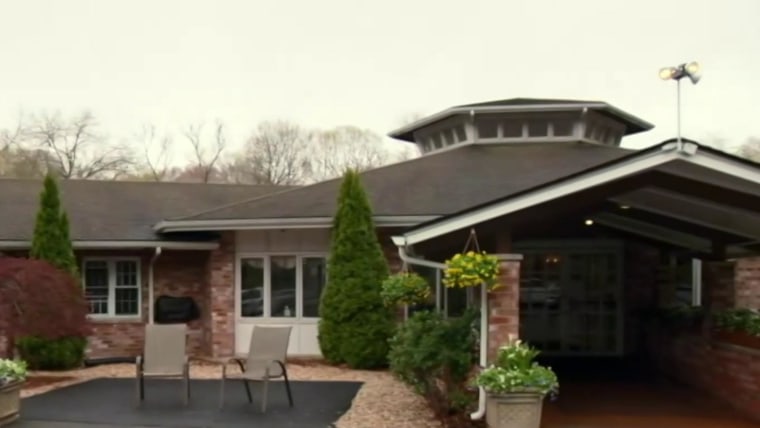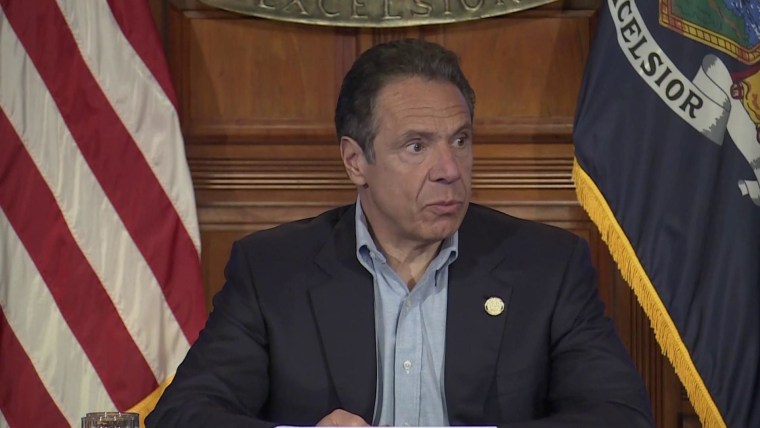WASHINGTON — The Trump administration is calling for nursing homes to test all residents and staff over the next two weeks as it prepares to "reopen" the country, but advocates and industry executives say that in many states, universal testing isn't feasible and that the federal government isn't providing the money or means to do it.
"There is no clarity on how this help is coming," said Katie Smith Sloan, CEO of LeadingAge, an association of nonprofit nursing home providers. "We need test results in minutes, not days, to contain the virus and to ensure that we do not lose staff while waiting for results. We also need ongoing testing, not just a Band-Aid."
On Tuesday, when President Donald Trump was asked whether he would consider a nationwide mandate for universal testing of nursing home residents and staff members, he responded: "I would mandate it, if you'd like. I think it is important to do, and I think, frankly, some of the governors were very lax when it comes to nursing homes."
The day before, Vice President Mike Pence had told governors during a video conference, "I want to say what we're urging with regard to nursing home testing is ... let's just get everybody in the homes, everybody on the staff, let's get them tested."
But the federal government "is not actually ensuring that nursing facilities have the tests they need to test all residents and staff," said Toby Edelman, senior policy attorney with the Center for Medicare Advocacy, which advocates on behalf of nursing home residents. "As usual, the federal government is putting responsibility on the governors but not giving them the help they need."
The nursing home industry is asking the federal government for $10 billion to help with testing and personal protective equipment needs.
Full coverage of the coronavirus outbreak
Dr. Morgan Katz, an assistant professor at the Johns Hopkins University School of Medicine who specializes in infectious diseases, said there was an urgent need to scale up testing in nursing homes.
In some Baltimore-area nursing homes with just five or six known cases, Katz said, broader testing revealed that 60 percent to 70 percent of all the residents were infected — most of whom were asymptomatic.
Katz said testing would need to happen regularly to be effective.
"The problem with universal testing is there needs to be a plan going forward — this is only capturing a moment in time," Katz said.
In Pence's state, Indiana, Dr. Daniel Rusyniak, chief medical officer of the Family and Social Services Administration, called the idea of testing all nursing home residents an "aspirational goal."
"While we are not currently at a place where that can occur, we will continue to work with our [long-term care] partners, hospitals, labs, and state agencies toward that goal," Rusyniak said.
Let our news meet your inbox. The news and stories that matters, delivered weekday mornings.
'The magic sauce'
Some state health officials are far ahead of the White House and have already widely implemented robust testing at long-term care facilities.
"It's really the countries that test the most and do the surveillance quickly and isolate — that's the magic sauce," Dr. Clay Marsh, West Virginia's coronavirus "czar," told NBC News. "On testing, if you don't know, you don't know."
Three weeks ago, with Marsh's guidance, Jim Justice became the first governor to require universal testing of all of his state's nursing home residents and staff.
Until then, West Virginia had tested 22,000 people. With the governor's executive order, Marsh had to scramble to find 28,000 more tests. He quickly thought back to a chance encounter with a laboratory executive at a West Virginia University football game.
LabCorp's head of diagnostic testing, Brian Caveney, has two degrees from the university and worked with the state to complete the testing in two weeks. Marsh said it cost West Virginia about $100 a test, or $2.8 million, for LabCorp to test the residents and staff members. "We could not have done it without them," he said.
While the results didn't reveal widespread infections, they allowed the state to develop a baseline. Moving forward, Marsh said, three strike force teams around the state will respond to any new infections with full facility testing. So far, the state has one of the nation's lowest death totals from the disease.
Maryland and Massachusetts have also embraced universal testing at nursing homes, as have Delaware, Illinois, Oklahoma, South Carolina, Tennessee and Texas, according to state health officials. New Jersey and California officials say they will soon implement universal testing.
But each state has taken a different approach, and not all of them have dedicated the necessary resources, said Kathryn Hyer, a professor of aging studies at the University of South Florida.
"The biggest single issue is that we don't have an agreement about what the right tests are or how often we should give them," Hyer said. "There is a lot of money coming to the states from the feds, but how is that money being allocated? The hospitals are the big gorillas. They are yelling for all that money."
In New York, where the most nursing home deaths have occurred, state officials announced Sunday that all nursing homes and assisted living facilities must test staff members twice a week — an estimated 185,000 employees statewide. But the state won't supply all of the 370,000 tests needed each week, and it has put county officials in charge of coordinating testing with nursing homes, a state health spokeswoman said.
Over the past week, New York has sent about 110,000 test kits to counties assisting nursing homes with testing, the State Health Department said. But that won't come close to meeting the need given the new testing mandate, said Stephen Hanse, president and CEO of the New York State Health Facilities Association and the New York State Center for Assisted Living, which together represent the state's long-term care facilities.
"We're running into shortages of tests," Hanse said. "Availability is the fundamental issue."
In California, Los Angeles County has already tested all staff members and residents in at least 25 percent of its nursing homes. More than half of all the county's coronavirus deaths have occurred in nursing homes, according to local public health officials.
In Tennessee, where an initial round of universal testing is expected to finish by the end of the month, the state has worked alongside the National Guard. State officials say some conclusions can already be drawn.
"The highest yield is in routine testing of the staff — weekly or two times a month," said Dr. Lisa Piercey, the state health commissioner. She said the Health Department is finding that the majority of the cases are coming from nursing home employees — and that some of those employees work at multiple facilities.
The Health Department paid for the 140,000 tests being conducted across the state. She said the agency is learning that waiting until a resident appears sick enough to test could be too late.
"You could be [asymptomatic] today and really be sick tomorrow," she said.
Piercey said she has recommended universal testing when she has fielded calls from officials in other states seeking guidance.
"I don't know that we can make a better investment," she said. "It's the right thing to do."
Other states that don't have universal testing say they want to test more staff members and residents but lack the supplies. In Idaho, a lack of supplies has kept officials from expanding testing in long-term care facilities, according to a spokesperson for the state health department.
Download the NBC News app for full coverage and alerts about the coronavirus outbreak
Carol Silver Elliott is CEO of The Jewish Home Family long-term care facilities in New Jersey, a state that plans to implement universal testing. She embraces universal, rapid testing and said that she wants to test anyone who comes into the building but that so far she lacks the means. She said that when she called Abbott Laboratories to buy a rapid testing machine, she was put on a waiting list.
She also says she recognizes that her concerns about infection must be balanced with the concerns of relatives who want to see their loved ones. "We can't keep elders like prisoners for the long haul," she said. "We are not wardens."
Asked whether it would pay for universal testing, the Centers for Medicare & Medicaid Services, or CMS, the federal agency responsible for nursing homes, didn't provide a direct response. In a statement, the agency said, "CMS's focus continues to be keeping nursing home residents safe and providing guidance for states and nursing homes on safety during these unprecedented times."
"may" - Google News
May 14, 2020 at 05:00PM
https://ift.tt/3cwkxGz
Trump wants nursing homes to test all staff and residents. That may not be possible. - NBC News
"may" - Google News
https://ift.tt/3foH8qu
https://ift.tt/2zNW3tO
Bagikan Berita Ini
















0 Response to "Trump wants nursing homes to test all staff and residents. That may not be possible. - NBC News"
Post a Comment